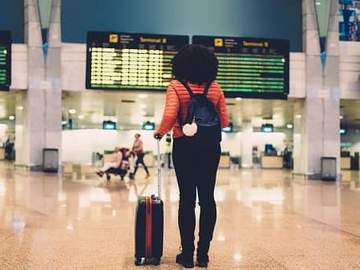When planning your next family adventure, you might find yourself pondering over itineraries, packing lists, and perhaps, the slightly perplexing spelling of a common word: travel. Specifically, should it be traveled or travelled? If you’ve ever paused mid-sentence, unsure which version looks right, you’re not alone. This seemingly small difference actually highlights a fascinating divergence in English spelling, primarily between the United States and the rest of the English-speaking world.
 Traveler at departure board, a visual metaphor for the spelling differences between travelled and traveled.
Traveler at departure board, a visual metaphor for the spelling differences between travelled and traveled.
The Root of the Two Ls: A Transatlantic Story
The reason behind this spelling variation boils down to geography and a touch of linguistic history. If you’re in the United States, you’ll predominantly see traveled and traveling. However, venture outside the US – to the UK, Canada, Australia, or New Zealand – and travelled and travelling become the standard. This split isn’t arbitrary; it’s largely attributed to the influence of one key figure in American lexicography: Noah Webster.
Noah Webster: Champion of Simpler Spellings
Noah Webster, the father of American dictionaries, believed in making English spelling more straightforward and logical. In the 18th and 19th centuries, he spearheaded a movement to reform English spellings in America, advocating for simpler, more phonetic versions. Webster felt that words like travel didn’t need the double “l” in their inflected forms (past tense and present participle). He argued that one “l” was sufficient, aligning with his vision of a more streamlined American English. This wasn’t just about travel; Webster’s reforms touched upon numerous words, aiming to differentiate American English and, in his view, improve its efficiency.
This principle is also evident in other words where American and British English spellings differ. Consider canceled versus cancelled. Just like traveled, American English favors the single “l” (canceled and traveling), while British English retains the double “l” (cancelled and travelling).
When to Keep the Double L: The Accent Rule
Interestingly, Webster’s simplification wasn’t applied universally. There are instances where American English also retains the double “l”. This generally occurs when the stress or accent of the word falls on the syllable before the “-ed” or “-ing” ending. Words like expelled, expelling, controlled, and controlling maintain their double “l” in American English because the emphasis is on the second syllable (“-pel” and “-trol”). Travel, however, has the stress on the first syllable, leading Webster to advocate for the single “l” in traveled and traveling.
Navigating the Spelling Landscape
So, when should you use traveled versus travelled? The simplest guideline is to consider your audience and location. If you’re writing for a primarily American audience, traveled and traveling are the standard and expected forms. For a broader international audience, or one specifically in a Commonwealth country, travelled and travelling are generally preferred and considered correct. Ultimately, both spellings are valid within their respective dialects of English. Understanding this distinction allows you to tailor your writing to your intended readers and confidently navigate the minor, yet noticeable, spelling variations in the English language as you document your family’s travels.
